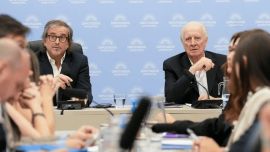The mood in Argentina is beginning to change. Unanimous support for President Alberto Fernández’s early lockdown order is beginning to wane, while the unity between government and opposition, illustrated by the tripartite press conferences starring the Peronist leader and Buenos Aires City Mayor Horacio Rodríguez Larreta — with Buenos Aires Governor Axel Kicillof trying to play along — is fracturing. The sentiment has been altered by the quarantine, of course, but a series of political seismic movements reveal a return to the fractured climate that characterised the last electoral campaign, or the past eight years for that matter. And behind it all appears the ominous silhouette of Cristina Fernández de Kirchner, stoking fears that a class act of puppeteering has fooled many into believing the marionette was alive and free. Yet, things are not as simple as they seem.
Alberto Fernández became president thanks to a pan-Peronist coalition that banded behind his VP, Cristina, the only one who truly pulled her weight with votes. Mrs. Fernández de Kirchner could’ve probably ousted Mauricio Macri without Alberto’s — and Sergio Massa’s — support, yet the presence of her former cabinet chief leading the presidential ticket allowed for the forming of a broader coalition, including several provincial governors who despise the Kirchnerite leader. It also helped the Frente de Todos coalition to juxtapose a moderate and conciliatory message of post-polarisation with the militant fervour of the Kirchnerite crowd, typified by their slogan (“Vamos por todo”) which translates roughly to: “We want it all.”
The global coronavirus pandemic caught observers by surprise, as pundits stopped asking whether Cristina would rule from the shadows and quickly became experts in epidemiology. It also allowed President Fernández to show autonomy and decisiveness while communicating a message of unity and constructive dialogue, in particular with Rodríguez Larreta. Whatever anyone might think of Covid-19, it is clear that Argentina’s early use of quarantines and border closures, and the extended lockdown, has been effective in keeping the number of virus-related deaths relatively low while giving the health system time to bulk up. It is also undeniable that the duration and scope of the quarantine is having a powerful economic impact, which adds to a dangerous stagflation that could produce a depression.
Argentina’s success in containing the novel coronavirus catapulted Alberto’s approval ratings, with Rodríguez Larreta and Kicillof coming along for the ride. Indeed, the three had become the most popular leaders in the country, quickly eclipsing their “political bosses” Cristina and Mauricio. The tide is turning, but the trend remains solidly in place. A poll put together by political analysis firm Atlas released yesterday indicates a larger percentage of the sample approves of President Fernández’s management of the pandemic, even though the margin between those in favour and those against has slimmed from 15.6 percentage points to 3.9 since early July. Alberto (+52 percent) and Horacio (+53 percent) remain the country’s most popular political leaders while Macri (-63 percent) and CFK (-59 percent) remain the most unpopular. While a vast majority of the sample agrees with the emergency measures being taken by the government to contain the virus (+64.1 percent), the group that disagrees has nearly doubled in size to 30.4 percent over the past two months, while the amount of people who think the public health situation is deteriorating has outstripped those who feel it’s improving. Those more worried about the economy have reached parity with those concerned about possible deaths at 47 percent.
The major shock to the president’s credibility, though, was the failed expropriation of agro-giant Vicentin. Not only are a lot more people against the measure (47.7 percent to 31.2 percent), but also the sensation that it’s of Cristina’s (45.9 percent) making, not Alberto’s (28.8 percent). That perception is concentrated geographically in the City of Buenos Aires and the central region of the country, among those older than 45, in middle and upper classes, and among those with higher education. This, of course, is Mauricio Macri’s electorate, who voted for his Juntos por el Cambio (Together for Change) coalition, which took 40.3 percent of the vote last year.
The Vicentin ordeal sparked an outcry from those who are deeply anti-Peronist, many of whom had supported the president’s handling of the pandemic, and have now convinced themselves that Fernández de Kirchner and her La Cámpora youth movement have taken over, constituting a form of “deep state” that runs the show. Indeed, cristinistas have taken over key offices such as the AFI spy agency, the leadership of the majority bloc in the Chamber of Deputies, and the presidency of the Senate, with none other than the former president herself.
Nowhere is the pervasiveness of the Kirchnerista mission more evident than in the Judiciary, where the federal justice system is investigating Macri and his key officials in a series of cases tied to illicit espionage, fraud, self-dealing, and more. At the same time, with the passing of federal judge Claudio Bonadio and the coming of a Peronist government, several major corruption cases involving Cristina and her family have begun to stall, while preventive prison sentences have been revoked for several former officials. There’s a battle to return the competency over wiretaps back to the Office of the Inspector General, where the government is looking to place federal judge Daniel Rafecas. Lawfare, of course, is Mrs. Fernández de Kirchner’s “get out of jail free” card.
While some imagine Cristina as an evil Machiavellian queen, others believe she is much more basic: all she cares about is keeping herself and her family out of prison – and political recognition to feed her self-esteem. Under this scenario, the “evil Cristina'' and “moderate Alberto” story crumbles, and the sudden bouts of irascibility and intolerance the president occasionally displays in his interventions with journalists aren’t just outbursts, but underlying character traits that constitute his true personality. Telling journalists to “go back to school and read the Constitution'' or calling protesters “confused” goes in line with the Alberto we remember as Néstor and Cristina’s cabinet chief. The use of emergency powers and “urgency” decrees to govern is also classic Kirchnerismo, while current Cabinet Chief Santiago Cafiero’s consistent hammering of the previous administration for today’s ills is probably representative of the President’s own beliefs.
Alberto and Cristina have been playing “good cop, bad cop” in order to keep the unity of their coalition and the predisposition of the opposition. But they are probably much more alike than many outside observers suggest, and will show their real colours as election season kicks off. The same questions should be asked about Juntos por el Cambio, where Rodríguez Larreta does belong to the so-called “political wing” of the opposition along with the likes of María Eugenia Vidal and Emilio Monzó, opposed to more fringe elements like PRO party president Patricia Bullrich and former VP candidate Miguel Ángel Pichetto. Macri, the supposed leader of the opposition, has remained quiet, but as one of the godfathers of la grieta — along with Cristina — there’s a big chance he’ll return to what was once a winning strategy.
The contours of polarisation are once again coming into sight.























Comments